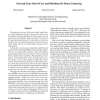Free Online Productivity Tools
i2Speak
i2Symbol
i2OCR
iTex2Img
iWeb2Print
iWeb2Shot
i2Type
iPdf2Split
iPdf2Merge
i2Bopomofo
i2Arabic
i2Style
i2Image
i2PDF
iLatex2Rtf
Sci2ools
111
click to vote
KAIS
2006
2006
Fast and exact out-of-core and distributed k-means clustering
Clustering has been one of the most widely studied topics in data mining and k-means clustering has been one of the popular clustering algorithms. K-means requires several passes on the entire dataset, which can make it very expensive for large disk-resident datasets. In view of this, a lot of work has been done on various approximate versions of k-means, which require only one or a small number of passes on the entire dataset. In this paper, we present a new algorithm, called Fast and Exact K-means Clustering (FEKM), which typically requires only one or a small number of passes on the entire dataset, and provably produces the same cluster centers as reported by the original k-means algorithm. The algorithm uses sampling to create initial cluster centers, and then takes one or more passes over the entire dataset to adjust these cluster centers. We provide theoretical analysis to show that the cluster centers thus reported are the same as the ones computed by the original k-means algor...
Algorithm | Entire Dataset | K-means | KAIS 2006 |
| Added | 13 Dec 2010 |
| Updated | 13 Dec 2010 |
| Type | Journal |
| Year | 2006 |
| Where | KAIS |
| Authors | Ruoming Jin, Anjan Goswami, Gagan Agrawal |
Comments (0)

